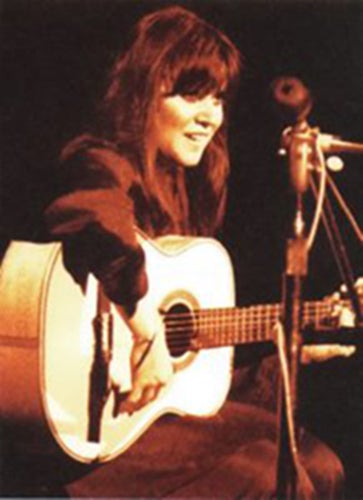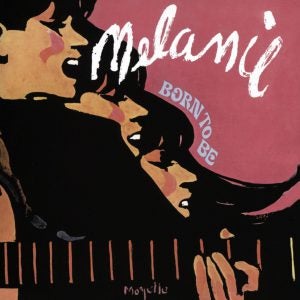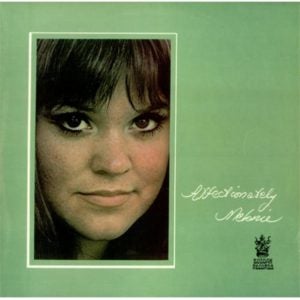Melanie
The festival’s first day continued as the rain began to subside a bit, with an opportune performance by a beautiful young woman who wasn’t even scheduled to play Woodstock. Melanie Safka, known professionally simply by her first name, walked on stage, sat down, and sang her songs from the heart.
Day One, Performer 6: Melanie
Performed Friday night, August 15, 11:00–11:30 pm

Melanie Safka: vocals, guitar
Melanie's Woodstock Setlist
- Close to it All
- Momma Momma
- Beautiful People
- Animal Crackers
- Mr. Tambourine Man
- Tuning My Guitar
- Birthday of the Sun
Melanie Anne Safka was born in Astoria, Queens, New York and was surrounded by music growing up. Her mother was a jazz singer, and, as Melanie said in a recent interview, “she’d take me to all the clubs, so I had a strong jazz influence, and I always wrote, always. When I was 5 and 6, I was writing torch songs, I didn’t know what I was saying, and my mom would laugh. As a teenager, I also got very into Kurt Weill and Lotte Lenya, and Billie Holiday, Bessie Smith—solo women who sing their hearts out. All that really hit me.” As a four-year-old, she made her public debut, singing “Gimme a Little Kiss” on a local radio show, and by the early 1960s was performing at The Inkwell, a coffee house in Long Branch, New Jersey where she was attending high school. She began singing in clubs in Greenwich Village, where she caught the eye of Columbia Records’ A&R man John Hammond. He signed her to the label, where she recorded two singles, one of which was “Beautiful People,” which would be a moderate hit in the Netherlands. The song showcased Melanie’s childlike voice and lyrics that reflected the simple spirit of the Summer of Love:
If I weren’t afraid you’d laugh at me
I would run and take all your hands
And I’d gather everyone together for a day
And when we gather’d
I’ll pass buttons out that say
Beautiful people
Then you’d never have to be alone
’Cause there’ll always be someone
With the same button on as you
Include him in everything you do.
Columbia Records, however, did nothing to promote sales or radio play of her music, and she left the label.
Late in 1968, Melanie met Peter Schekeryk, who arranged for an audition at Buddah Records and soon took charge of the young singer-songwriter’s career. They went into the studio and recorded her first album, Born to Be, which was released in late 1968/early 1969. The album was a mixture of musical styles that some critics thought reflected a lack of direction, but the album contained songs that would remain in the Melanie songbook throughout her career.

Melanie was ready for her big break, and it came through the efforts of Buddah co-founder Artie Ripp. The one-time-musician-turned-record-executive was a friend of Woodstock organizer Artie Kornfeld, and Ripp decided to take a risk and send Melanie to the festival on the chance that she could perform. Melanie describes the experience in an interview with Ray Shasto posted at www.classicrockhereandnow.com, “I was in England and had been asked to do a film score and been working in the studio right next door to where The Rolling Stones were. I had the London Symphony Orchestra in the studio with me and my husband was the producer and I was deciding whether I should go back and do this Woodstock thing. I had pictured…three days of peace, love, and music was going to be more like a picnic with kids, families, arts and crafts, and going shopping…I had no clue! My mother drove me to Woodstock. We went to the wrong place and then finally found the hotel and I was all by myself with my mom. So we got to the hotel and there’s Sly Stone walking by. Then surrounded by media was Janis Joplin drinking Southern Comfort and all of a sudden, now I know this was something really big. That traffic wasn’t just an accident ahead it was something really-really big and I was going to have to sing in front of it.”
She continues, saying, “We were told that we needed to go in a helicopter. I had never been in a helicopter before so I asked why can’t we just drive like everyone else. So we get into the helicopter and they stop my mother…they asked who is she and I said it’s my mother. They said no mothers, just the performers and managers. I didn’t even have the smarts to say 'oh yeah she’s my manager'. I said 'bye mom' and we were separated.”
Melanie’s unscheduled performance at Woodstock was memorable, for both her and her audience. She played without additional accompaniment—one of only three performers at Woodstock to do so, and the only woman—and the festival was certainly the largest audience of her career. She walked out onto the stage alone, wearing a loose-fitting red tunic and pants, sat down on a metal folding chair, and began playing the quiet, contemplative “Close to it All” followed by the more forceful “Momma Momma,” both from her debut album. When she began singing her next song, “Beautiful People,” there was a sprinkling of applause from the audience members who recognized the song, which was only getting radio play in the U.S. on selected FM stations. As she finished the song, she added a nervous giggle and a line in her lyrics about “beautiful, wet people, too,” referring to the sporadic rain that had started during Ravi Shankar’s set just before hers. Two more songs from the debut album followed: her campy, rather juvenile rendition of “Animal Crackers” and Bob Dylan’s “Mr. Tambourine Man.” Like Dylan himself, her arrangement of the song is almost a blend of melody and spoken word with a childlike voice full of vibrato. Melanie ended her half-hour impromptu set with two songs that would appear on her next album, Affectionately. “Tuning My Guitar,” like many of Melanie’s songs, starts out slowly and quietly and builds to an almost trance-like screaming chant. The audience showed their appreciation and she launched into a song she had only just written and had never played in public, “Birthday of the Sun.” It, too, began slowly and reached a frenzied crescendo to end her set. She walked off stage alone as she had entered it, and the audience showed her their love.
“Woodstock was a life-changing experience,” Melanie recently told an interviewer. “I really sensed a connectedness with the people. I felt a positive wave and human power flowing into me and can never forget that. The people who will ever experience that…and I think Richie was one and really felt that too. I had an out-of-body experience when I walked out on that stage. I left my body. I didn’t hear a thing; I wasn’t there and was hovering above my body and at some moment felt one with myself again. It was the extraordinary circumstance that I was put in.”
After Woodstock, Melanie returned to the recording studio and released her second album with Buddah, Affectionately, which did slightly better in the charts than did her first album. She released the single “Lay Down (Candles in the Rain)” in July 1970 and the Woodstock-inspired song became her best-known. Stories from various sources differ, but members of the Hog Farm commune had apparently handed out candles throughout the Woodstock audience before Melanie’s set, and at one point on the pitch-black hill that rolled away from the stage, people began holding lighted candles and lighters above their heads in appreciation for Melanie’s performance. This now-common sight at concerts was unheard-of in 1969. Inspired by the sea of flickering flames and the positivity and optimism she felt from the crowd, Melanie wrote the song “Lay Down (Candles in the Rain)” after the festival to commemorate the moment, and she recorded it with gospel group The Edwin Hawkins Singers. The song reached #6 on the U.S. charts, and the album reached the Top 20.

Also in 1970, Buddah released Melanie’s live album, Leftover Wine, including her cover of The Rolling Stones’ “Ruby Tuesday” as a single. In January 1971, the single “What Have They Done to My Song, Ma” reached #39 in the U.K., and in May, Buddah released Melanie’s fourth album, The Good Book, which only reached #80 on the U.S. charts. That summer, Melanie left Buddah and she and Peter Schekeryk—by this time her husband—created their own label, Neighborhood Records. The new label’s first single, “Brand New Key,” went to #1 in the U.S. and stayed there for almost two months, selling over a million records. The album that followed, Gather Me, received critical acclaim, with Billboard stating that the album was “the best produced long-player she had ever released.” Other singles followed, and Melanie became one of the best-selling recording artists of 1971. She was a sought-after guest on The Ed Sullivan Show, The Dick Cavett Show, and The Tonight Show with Johnny Carson, and she played high-profile festivals like Glastonbury and Isle of Wight.
Melanie’s success didn’t last long, and a string of albums released from 1972 to 1977 all had disappointing sales. Melanie also had three children between 1973 and 1980. She released a comeback album and did a series of concerts 1982–83. She won an Emmy Award for writing the lyrics to the theme song for the television series Beauty and the Beastand kept a low profile. By 1989, there was a growing wave of Woodstock nostalgia spawned by several 20th-anniversary concerts and events. Melanie performed at one of these in Bethel, New York and at similar observances at later anniversaries. She was also part of the Heroes of Woodstock tour that made a stop at Bethel Woods Center for the Arts in 2009 for the 40th anniversary of the festival.
Melanie considers herself a “genre-less” singer-songwriter, stating that “I’m not a folk singer. I am not a social commentator. But I am definitely driven by the power that people have and when it gets taken away from them, that moves me. My mission statement is all about human rights. At age 20, I didn’t even know what ‘humanist’ meant, but I was one and I’ve always done work with UNICEF and other organizations.”
Melanie has continued to perform at clubs in the U.S. and at major festivals in Europe. She has over 30 albums to her credit and she continues her work as a UNICEF music ambassador and fervent libertarian.
—Wade Lawrence & Scott Parker
